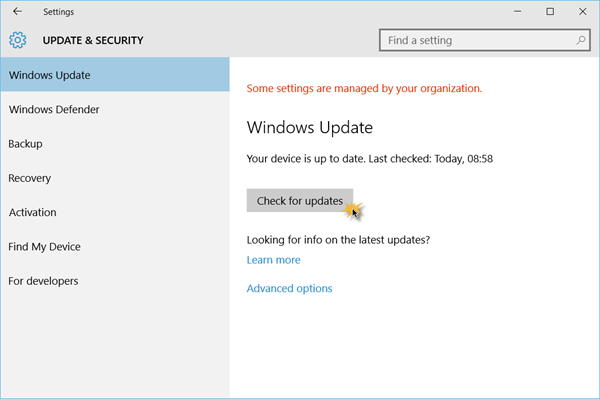How Do I Check For Microsoft Updates On Mac
Oct 18, 2019 Choose System Preferences from the Apple menu , then click Software Update to check for updates. If any updates are available, click the Update Now button to install them. Or click ”More info” to see details about each update and select specific updates to install. Now your Mac will install system data files and security updates, but it won't install major updates unless you trigger the update yourself via the Mac App Store or by selecting the Apple menu. Mar 31, 2020 How to Check for and Install Updates on a Mac Computer. Software updates keep your computer and programs secure, fix errors, and provide new features. Many apps that you install will get regular updates that can improve functionality. Tech support scams are an industry-wide issue where scammers trick you into paying for unnecessary technical support services. You can help protect yourself from scammers by verifying that the contact is a Microsoft Agent or Microsoft Employee and that the phone number is an official Microsoft global customer service number. Oct 18, 2019 If any updates are available, click the Update Now button to install them. Or click ”More info” to see details about each update and select specific updates to install. When Software Update says that your Mac is up to date, the installed version of macOS and all of its apps are also up to date.
To ensure the security of your Office suite and to get all of the latest features, upgrade to the latest version of Office for free as part of your Office 365 subscription. Office 365 subscribers can no longer download or install Office 2013 on PC or Office 2011 for Mac from the account portal. Microsoft office 2013 for free mac.
- Microsoft Updates
- How Do I Check For Microsoft Updates On Mac Pc
- How Do I Check For Microsoft Updates On Mac Computer
Applies to:Office for Mac, Office 2019 for Mac, Office 2016 for Mac
Microsoft AutoUpdate (MAU) version 3.18 and later includes the msupdate command-line tool. This can be used to start the update process for Microsoft applications produced for Mac, such as Office. The tool is primarily designed for IT administrators so that they have more precise control over when updates are applied. You can download the latest version of MAU from this link.
msupdate works by sending Apple Events to the MAU daemon. On macOS 10.14 Mojave and later, you may see a privacy prompt when running msupdate for the first time. If you are using an enterprise management tool such as Jamf Pro, you should deploy a Privacy Preferences Policy Control (PPPC) payload to pre-approve access. Samples of such a payload can be downloaded from here.
Use the following steps to start using the tool:
- Open the Terminal application
- Enter
cd /Library/Application Support/Microsoft/MAU2.0/Microsoft AutoUpdate.app/Contents/MacOS - Run
./msupdate --help
The following options are displayed:
Examples of how to use msupdate
- Display the current configuration parameters for AutoUpdate:
./msupdate --config - Display the current configuration parameters in machine-readable format:
./msupdate --config --format plist - List all available updates:
./msupdate --list - Download and install all available updates:
./msupdate --install - Download and install the latest updates for Word, Excel, and PowerPoint:
./msupdate --install --apps MSWD2019 XCEL2019 PPT32019 - Download and install a version-specific update for Outlook:
./msupdate --install --apps OPIM2019 --version 16.17.180090901
Application identifiers
The following table lists the applications for Mac supported by AutoUpdate. The identifier is used when specifying the --apps parameter. When specifying multiple applications on the command-line, separate identifiers with a space.
The MacBook Pro's screen has a resolution of 2,560 x 1,600 pixels and the Surface Book 2's screen has a resolution of 3,000 x 2,000 pixels, but those numbers don't tell the full story. Microsoft surface book 2 vs macbook pro.
| Application | Latest version1 | 2016 version2 |
|---|---|---|
| Word | MSWD2019 | MSWD15 |
| Excel | XCEL2019 | XCEL15 |
| PowerPoint | PPT32019 | PPT315 |
| Outlook | OPIM2019 | OPIM15 |
| OneNote | ONMC2019 | ONMC15 |
| MAU | MSau04 | MSau04 |
| OneDrive | ONDR18 | |
| Teams | TEAM01 | |
| Skype for Business | MSFB16 | |
| Remote Desktop | MSRD10 | |
| Intune Company Portal | IMCP01 | |
| Defender ATP | WDAV00 | |
| Edge Canary | EDCN01 | |
| Edge Dev | EDDV01 | |
| Edge Beta | EDBT01 | |
| Edge Stable | EDGE01 |

Microsoft Updates
1 These identifiers are used for Office 2019 for Mac, either a retail or a volume licensed version, and for Office for Mac (from an Office 365 plan) running on macOS version 10.12 (Sierra) or higher.
2 These identifiers are used for Office 2016 for Mac, either a retail or a volume licensed version, and for Office for Mac (from an Office 365 plan) running on macOS version 10.11 (El Capitan) or earlier.
Note
- If an update is pending for MAU itself, that update must be applied before any applications can be updated.
- Identifiers are not case-sensitive when run interactively from the command-line, but use the character casing from the table above when running from a management tool such as Jamf Pro.
How Do I Check For Microsoft Updates On Mac Pc
Related topics
How Do I Check For Microsoft Updates On Mac Computer
- Update history and release notes for Office for Mac